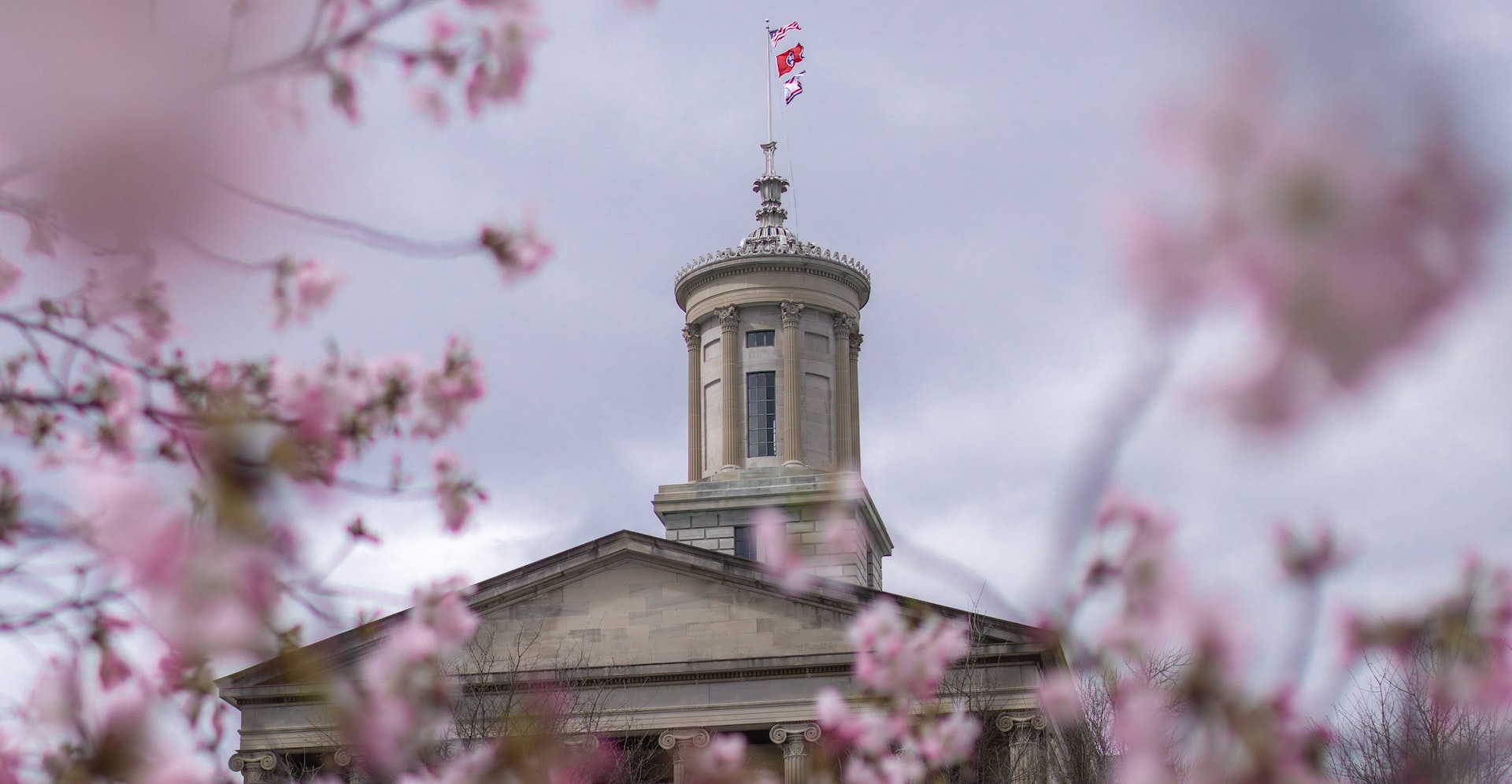Since the start of 2019, 44 different carbon pricing bills have been introduced in states in every region of the country. While some states have considered carbon pricing for many years, such as Massachusetts and Oregon, others are just beginning to examine the policy and have introduced it for the first time in their most recent sessions.
Tennessee is one of these states, as the need for smart climate policy has become more apparent there. The bill (HB 2593 / SB 2410), introduced on February 5th this year by Representative Vincent Dixie in the House and Senator Katrina Robinson in the Senate, puts a $10 price on carbon pollution.
Although the legislative session is now in recess for an unknown amount of time due to the COVID-19 crisis, the introduction of this bill was a big step for the state, and is symbolic of an expansion of carbon pollution pricing across the country, even in states that have been more reluctant to move on climate.
What does this bill do?
The bill requires electricity providers that use natural gas and coal to pay a $10 fee per ton of carbon emitted, amending the Tennessee Tax Code in order to hold “excessive polluters” accountable. This bill differs from many other carbon pricing initiatives, and is much more lenient, because the fee is only applied if providers emit more than 500,000 metric tons of carbon. Many other states apply carbon fees to polluters who emit much less. The bill also establishes a formula for calculating carbon emissions as well as administration of the tax.
60% of revenue from the bill will go toward the Tennessee general fund, while the remaining 40% will be invested in the municipality or county where the taxpayer’s business is located.
Before the legislative session was suspended, both bills were being debated in their respective Agriculture and Natural Resources Committees.
Businesses in Tennessee begin to understand climate threats
Tennessee’s economy is very diverse — agriculture, manufacturing, and tourism are three of its largest sectors. The introduction of this bill is especially important, considering the state is typically hesitant to regulate industry. “Tennessee is a business-amenable state, very business-friendly, and they don’t want to do too much to rock that boat. We have very low property taxes, no income tax, and it’s easy to attract businesses here. But we need to start putting some requirements in,” Representative Dixie, sponsor of the House bill, told Climate XChange.
Although the state generally does not heavily regulate its economy, private companies throughout its top sectors are beginning to recognize the threats climate change has on their industries, and are becoming more and more supportive of climate legislation. Many have even begun to change their own policies to adapt to the changing environment.
These include a wide variety of companies, from Wampler’s Farm Sausage, headquartered in Lenoir City since 1937, which has committed to producing its product sustainably, “with practices that give back to our local and global communities and pay it forward to future generations;” to the Hutton Hotel, which “uses biodegradable cleaning products, implements recycling initiatives, uses LED bulbs, and uses soap, shampoo, and conditioner dispensers to reduce plastic waste;” and the Nashville International Airport, which has recently implemented a plan to reduce waste within the terminals.
“Right here in Tennessee, we already know first-hand how alternative energy solutions can create jobs and boost local economies. Companies like Wacker Chemie AG, Shoals Technology Group, and Nissan have invested across the state in solar power technology, electric automobiles, and advanced batteries,” says Congressman Jim Cooper, who has also emphasized the importance of the private sector in climate change mitigation.
Tennessee and climate policy
Despite increased industry engagement, Tennessee has been hesitant to move forward on climate in the past because of the political make-up of its state government — Republicans hold supermajorities in both the House (73-26) and the Senate (28-5).
Traditionally, municipalities in Tennessee have taken the lead on climate action. The City of Knoxville’s Energy and Sustainability Initiative demonstrated leadership by establishing emission reduction targets, aiming to reduce emissions within city operations and the community at large by 20% by 2020, 50% by 2030 and 80% by 2050 relative to 2005 levels, on par with goals in more ambitious U.S. states.
“Knoxville is making their infrastructure more resilient to flooding and storms and working to reduce its greenhouse gas emissions, partnering with local utilities and citizens groups,” said Senator Sheldon Whitehouse of Rhode Island, who visited the city to learn more about their climate efforts.
Recently, however, momentum for climate policy has also increased at the state level, even in more conservative circles. Although Governor Bill Lee has expressed uncertainty about the causes of climate change, he stated, “I certainly believe we have a responsibility to protect the environment and to limit those influences that may impact the climate change in our country.” While this is far from the ambitious statements of Governors in many other states, it does signal that Gov. Lee may be open to stronger climate measures in the future.
Other popular climate bills have been introduced this session, including a proposal to ban both plastic and paper bags (SB2131/HB2369), introduced by Republican Senator Bill Briggs in the Senate and Representative Dave Wright in the House, and supported by the environmental advocates across the state.
Climate activism is also gaining traction in Tennessee this year. In February, environmental advocacy groups planned a Conservation Education Day, where citizens were trained to meet with legislators to promote climate-friendly bills and advocate against anti-climate legislation. This was a massive display of climate support, and proved to legislators that constituents in Tennessee really care about tackling the climate crisis through legislation.
Why is moving on climate important for Tennessee?
Like many other states, the effects of the climate crisis are beginning to clearly manifest in Tennessee, highlighting the importance of passing carbon pricing and other strong climate bills in the state.
Representative Dixie himself has been affected by climate change. “I live two miles from a dump where hydrogen sulfide permeates the air, and I don’t know if the body can handle it or not. That is what led me to this work. The carbon pricing bill will try to get larger industries to better incorporate community partners, and will tax them for not being compliant,” he told Climate XChange in an interview.
Tennessee is ranked 11th worst state in the country for emitting toxic pollution from coal plants, and communities across the state similar to Rep. Dixie’s are subject to the effects that this causes.
Read our recent report on the health benefits of carbon pollution pricing
Air pollution is not the only climate-related threat that Tennessee faces. Chattanooga, Tennessee is the 6th fastest-warming city in the US, and the state currently averages 10 dangerous heat days per year, with this number expected to skyrocket by 2050. With more than 200,000 Tennessee residents vulnerable to extreme heat, this is a major threat to public health. The increased heat not only puts individuals more at risk to heat stroke and dehydration, but it also decreases air quality, which can lead to increased cases of respiratory and cardiovascular illnesses, and contributes to a growing mosquito population, meaning Tennessee residents will be more at risk to viruses such as West Nile and Zika.
Climate change also poses a massive threat to Tennessee agriculture and infrastructure, which make up a huge chunk of the state’s economy — a report by the Environmental Protection Agency found that “the changing climate is likely to reduce crop yields, threaten aquatic ecosystems, and increase risks to human health,” as droughts and flooding both become more frequent and availability to water becomes less secure.
Looking towards the future
The carbon pricing bill in Tennessee, along with other climate bills proposed this session, are unlikely to pass now that the session has prematurely ended. But this does not mean that the momentum for climate policy in Tennessee will subside, as the clear need to reduce pollution persists.
The introduction of carbon pricing in the Tennessee legislature is a big step in a conservative state, and is symbolic of a larger, national push towards market-based mechanisms as a solution to the climate crisis.
Next session, it is very likely that a similar bill, along with other climate legislation, will be proposed in the state, and may be able to gain even more traction as awareness for the policy increases across public and private sectors.
Sign up to our newsletter here to stay in the loop for updates on state-level climate policy and carbon pollution pricing.









